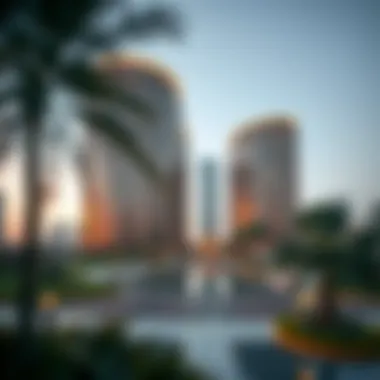Exploring Office Parks in Dubai's Real Estate Landscape


Intro
In the vibrant heart of the UAE, Dubai beckons with its blend of innovation, tradition, and a uniquely cosmopolitan atmosphere. Office parks, as the backbone of its burgeoning economy, play a pivotal role in supporting businesses of all sizes. From multinational corporations to fledgling startups, the demand for well-designed, strategically located office space continues to grow. This article explores the complexities of Dubai’s office park landscape, revealing insights through an examination of market trends, investment opportunities, and future prospects.
With the real estate sector evolving rapidly, keeping a pulse on market dynamics provides a competitive edge for a diverse array of stakeholders, including investors, developers, and expatriates seeking to plant roots. The ongoing trends in sustainability and technological integration further underscore the significance of understanding this intricate tapestry.
Navigating this landscape isn’t just about finding a building; it’s about finding a space that resonates with the future needs of businesses and their employees. Let’s delve into the market trends shaping this sector.
Understanding Office Park Buildings
In the context of Dubai's booming real estate market, understanding office park buildings is not merely academic; it’s essential for anyone in the investment, development, or tenant sectors. Office parks are designed to cater to a wide variety of professional activities, creating environments that promote business synergy and foster innovation. They typically encompass multiple buildings, which may host a mix of corporate offices, meeting spaces, and sometimes recreational facilities, all situated within well-planned landscapes.
In Dubai, the role of office parks goes beyond just being physical spaces; they symbolize the city’s aspirations towards becoming a global business hub. These structures are thoughtfully designed to enhance productivity through features that emphasize accessibility, technology integration, and aesthetic appeal.
Key Benefits of Office Parks:
- Improved Accessibility: Strategically located near major highways and public transportation, bringing businesses closer to clients and partners.
- Cost-Effectiveness: Shared amenities like conferencing facilities can significantly reduce overhead costs for tenants.
- Networking Opportunities: Proximity to other enterprises fosters collaboration and networking among businesses in similar or complementary fields.
- Enhanced Brand Image: A modern, well-maintained office park can elevate the reputation of businesses housed within it, something especially important in a competitive landscape like Dubai.
In summary, diving deep into the understanding of office parks is crucial for grasping their implications on the overall Dubai economy and real estate landscape. Investors and developers are constantly on the lookout for these characteristics which not only entice tenants but also potentially augment the investment growth trajectory.
Definition and Characteristics
Office parks in Dubai are defined by a mix of flexibility and structure. They are often characterized by their low-rise buildings surrounded by landscaped grounds. This type of layout promotes collaboration among tenants. Unlike traditional office buildings, which may be static in function, office parks can adapt to different business needs, establishing an environment that promotes interaction.
Some common characteristics include:
- Diverse Space Options: From single offices to expansive leased spaces, accommodating various business sizes.
- Amenities: Facilities such as gyms, restaurants, and cafes encourage a balanced work-life environment.
- Sustainability Features: Many modern office parks integrate eco-friendly practices such as green roofs or energy-efficient appliances, aligning with global sustainability goals.
Historical Context
The development of office parks in Dubai has evolved in response to the city's explosive growth. In the 1990s, as Dubai started establishing itself as a business-friendly destination, the concept of office parks began to emerge. Initially concentrated around the Dubai Internet City and Dubai Media City, these office parks served as incubators for burgeoning sectors in technology and media.
As the city shifted gears in the 2000s, office parks started to incorporate more modern design principles as well as technological advancements. This evolution mirrored the changing demands of businesses that sought not just workspace, but environments conducive to collaborative endeavors and innovative practices. The growth continues into today, as office parks adapt to new business models and the impacts of a global pandemic.
Architectural Trends
Recent architectural trends in Dubai's office parks embody a blend of contemporary aesthetics and function. Developments often feature open-plan designs that maximize natural light while allowing flexibility in how spaces can be utilized. With sustainability in mind, many office parks incorporate innovative designs that utilize environmentally friendly materials and construction methods.
Some noteworthy trends include:
- Biophilic Design: Incorporating natural elements to improve employee wellbeing and productivity.
- Modular Spaces: Easily adjustable floor plans to cater to varying needs as companies grow or shrink.
- Smart Technology Integration: Systems that support energy management and optimize the workspace for better utilization.
The architectural landscape of Dubai’s office parks reflects larger trends in urban design and sustainability. With ongoing advancements, it contributes to making these spaces not just functional, but also appealing environments suited for the modern workforce.
The Role of Office Parks in Dubai's Economy
The significance of office parks in Dubai's economy cannot be overstated. Emerging as dynamic hubs for innovation and collaboration, these environments not only provide space for business operations, but also play a pivotal role in stimulating local employment and economic growth. They serve as focal points where enterprises flourish and where economic activity tends to thrive. Understanding how office parks contribute to Dubai's economy offers insights into the broader implications for stakeholders.
Contribution to Employment
Office parks are integral to Dubai's employment landscape. They host a diverse range of industries, from finance to technology, accommodating thousands of employees who contribute to the emirate’s dynamic workforce. With specific zones dedicated to certain sectors, such as Dubai Internet City for tech companies and Dubai Media City for media and marketing firms, these parks have created a niche environment that allows businesses to leverage synergies with each other.
- Local Job Creation: The establishment of new office parks often leads to significant job creation. Once a new building opens its doors, it generally employs a mix of local residents and expatriates, driving demand for various skills and expertise. This creates a vibrant workforce that attracts further investment.
- Support for SMEs: Many office parks offer incubator services and co-working spaces that nurture small and medium enterprises, which are crucial for job creation. These spaces enable startups to grow with lower overhead costs, allowing them to innovate and contribute to economic diversification.
- Attracting Talent: The business-friendly environment of these parks draws talent from around the world, enhancing the emirate's reputation as a global business hub. It fosters a melting pot of ideas and cultures – essential for industries that thrive on creativity.
Influence on Local Businesses
Office parks serve as catalysts for local businesses, extending their reach and creating new opportunities. The proximity of various companies in these parks enhances networking possibilities, allowing local businesses to tap into a larger client base and foster partnerships.
- Enhanced Collaboration: Companies within office parks can easily collaborate with each other, leading to innovative solutions and joint ventures that enhance productivity.
- Supply Chain Accessibility: The locality of office parks boosts the accessibility of suppliers and clients, minimizing logistical challenges. This is especially important for small businesses that rely on local partnerships.
- Economic Ecosystem Development: Office parks contribute to the creation of a comprehensive economic ecosystem. They attract amenities such as coffee shops, restaurants, and professional services, which enrich the local economy and create a vibrant atmosphere around them.
Impact on Infrastructure Development
The development of office parks has a significant impact on the infrastructure of Dubai. As these parks arise, they require enhancements to the surrounding infrastructure, from transport links to utilities.
- Transportation Improvements: The influx of employees and visitors necessitates reliable public transport options and road improvements. This results in better connectivity not only for the office parks but also for other surrounding regions.
- Utility Upgrades: Increased demand for resources such as water and electricity often leads to improvements in utility systems, benefiting the broader community.
- Urban Planning Synergies: Office parks influence urban planning efforts, prompting the government to focus on zoning laws and developmental strategies that promote balanced growth across the emirate.


In summary, the role of office parks in Dubai's economy is multifaceted. From creating job opportunities to fostering local businesses and driving infrastructure development, these venues are essential to understanding the emirate's economic landscape.
As investors and stakeholders navigate the complexities of Dubai's real estate market, ensuring awareness of these contributions can provide meaningful insights into future opportunities.
Investment Potential in Office Parks
As we explore the investment landscape within Dubai's office parks, it's essential to recognize the strategic advantage these spaces offer to investors, both local and international. The significance of office parks is not merely in their architectural grandeur, but in their capacity to provide stable revenue streams and potential growth, reflecting the ever-evolving dynamics of the business environment.
Office parks in Dubai demonstrate a unique investment opportunity, driven by several compelling factors. For one, these properties attract a diverse range of tenants, from tech startups to multinational corporations, ensuring a constant demand for space. Moreover, Dubai's robust economic framework, characterized by clear regulatory processes and minimal taxation, enhances the attractiveness of these investments. As such, understanding market trends and data analysis becomes crucial for stakeholders looking to maximize their potential returns.
Market Trends and Data Analysis
A detailed look at the market trends in Dubai's office park sector reveals some notable patterns. Recent data indicates that the demand for flexible and shared office spaces has surged, particularly in the aftermath of the global pandemic. This influx points to a shift in tenant preferences towards more dynamic working environments that can adapt to changing business needs.
"Office parks are shifting from mere buildings to dynamic ecosystems reflecting modern work trends."
A few trends have emerged:
- Increased Interest in Flexible Spaces: Many companies are moving towards flexible leasing arrangements that allow them to adapt their office requirements swiftly based on workforce size and business needs.
- Sustainability Trends: Investors are keenly aware of the rising emphasis on green building practices in office parks, with eco-friendly certifications becoming a significant decision factor.
- Technology Integration: Favorable technological infrastructure, such as high-speed internet and smart building systems, not only attract tenants but also enhance property value.
ROI Considerations
When it comes to assessing the return on investment in office parks, several aspects need to be kept in mind. The initial costs associated with purchasing or developing an office park can be substantial. However, the potential for significant ROI often compensates for these expenditures.
Factors influencing ROI in this context include:
- Occupancy Rates: Higher occupancy leads to stable rental income. An office park with a consistent tenant base can result in reliable cash flows, which are integral to ROI calculations.
- Market Position: Location remains king. Office parks in prime areas benefit from higher demand, which can drive up rental prices. An excellent location also reduces vacancy periods significantly.
- Long-Term Lease Agreements: Many tenants prefer security, thus signing longer leases can provide investors peace of mind regarding long-term income.
Comparative Analysis with Other Property Types
A comparative analysis illustrates how office parks stack up against other investment property types. Unlike traditional office buildings, which may face challenges with older layouts and rigid structures, office parks often offer flexibility and adaptability.
- Lower Maintenance Costs: Office parks often have shared amenities that reduce individual maintenance burdens compared to standalone office buildings.
- Community Appeal: These developments foster a sense of community, attracting not just businesses but also wellness-oriented services, further enhancing their appeal.
- Diverse Revenue Streams: Office parks often host various businesses, reducing the risk of substantial income loss. This diversification is a significant draw for investors when compared to single-use properties.
In summary, the investment potential in Dubai's office parks is multifaceted, driven by market trends, ROI considerations, and the competitive advantages these properties hold over more conventional property types. For savvy investors, understanding these dynamics is key to making informed decisions that align with the future of work and urban development.
Design Principles of Modern Office Parks
Design principles play a critical role in the way office parks are conceptualized and executed, especially in a place like Dubai where the skyline is constantly evolving. These principles not only shape the aesthetic appeal of the structures but also impact their functionality, sustainability, and alignment with the changing needs of businesses and employees.
Sustainability and Green Building Practices
In today’s real estate landscape, especially in Dubai, sustainability isn't just a buzzword; it's becoming the backbone of office park designs. This shift is driven by the pressing need to reduce carbon footprints and create healthier environments for workers.
Office parks are increasingly incorporating features like energy-efficient HVAC systems, solar panels, and rainwater harvesting systems. Green roofs and gardens not only improve air quality but also provide recreational spaces for employees. Additionally, using local materials reduces transportation emissions, making buildings more environmentally friendly.
The benefits of these practices extend beyond just compliance with regulations. They have been shown to enhance employee productivity and satisfaction, leading to better retention rates. Companies that invest in sustainable office parks often reap financial rewards, as tenants are willing to pay a premium for environmentally responsible spaces.
"Investing in green building practices in Dubai can yield long-term benefits, fostering a positive image while promoting environmental responsibility."
Flexible Space Configurations
Flexibility has become a keystone in modern office park design. As work environments continue to evolve, the traditional notion of fixed workspaces is giving way to more adaptable layouts. The idea is to create spaces that can be easily reconfigured to cater to varied needs—from open-plan areas for collaborative work to quieter, more private sections for focused tasks.
By incorporating movable walls, modular furniture, and multi-purpose areas, office parks can accommodate the diverse functions businesses require today. This adaptability is particularly important in the wake of the pandemic, where hybrid models of work are becoming commonplace.
Additionally, flexible designs provide landlords with the advantage of attracting a broader spectrum of tenants, including startups and established corporations. Spaces that can be reconfigured quickly to suit tenants’ specific requirements stand out in a competitive market, adding significant value.
Technology Integration
Incorporating technology is no longer an optional addition; it’s a fundamental aspect of modern office park design. Smart buildings equipped with the latest technology not only streamline operations but also create better environments for tenants. This can include everything from automated lighting and climate controls to advanced security systems that ensure safety and efficiency.
Moreover, the integration of robust IT infrastructure allows for seamless connectivity, which is crucial for businesses in this digital age. Tenants expect fast and reliable internet access, and the buildings that provide this will have a competitive edge.
The future also points toward the incorporation of Artificial Intelligence and IoT devices that can monitor usage patterns, optimize energy consumption, and enhance the overall user experience. As office parks evolve, those that embrace these technological advancements will likely find greater appeal among tenants who place a premium on modernity and efficiency.
In summary, the design principles of modern office parks in Dubai hinge on sustainability, flexibility, and technology. These elements not only improve the attractiveness of the spaces but also ensure they meet the ever-changing demands of businesses and their employees. Investors and developers keen on securing a profitable return should thus pay careful attention to these essential factors in their design and development phases.


Challenges Facing Office Parks
Office parks in Dubai have long been seen as the backbone of business infrastructure within the emirate. However, like any sector, they face a myriad of challenges that can impact their stability and growth trajectory. Understanding these challenges is crucial for stakeholders, including investors, developers, and tenants, as they navigate through uncertain waters in a rapidly evolving landscape. Recognizing the importance of these hurdles allows for strategic planning and helps mitigate risks associated with economic downturns, evolving work habits, and technological disruptions.
Economic Fluctuations
In the realm of real estate, economic fluctuations can serve as both a boogieman and a best friend. Office parks are particularly sensitive to the nuances of the economy. When times are tough, businesses often tighten their belts, leading to decreased occupancy rates in office spaces. This can, in turn, lead to leasing price drops, affecting cash flow for landlords and investors.
Conversely, during bullish periods, demand for office space can soar. Yet, it's essential to recognize that rapid growth can lead to overbuilding, which creates an oversupply when the market corrects itself. In Dubai, investors and developers must keep a close pulse on global economic trends and local market indicators to make informed decisions. For instance, fluctuations in oil prices, tourism revenue, or international trade can create a ripple effect that reverberates throughout the office park ecosystem.
The Dubai office market is alway fluctuating; keeping a close eye on global dynamics is key for sustained success in the sector.
Changing Work Paradigms Post-COVID
The COVID-19 pandemic changed the face of nearly every industry. Office parks in Dubai are no exception to this shift. As companies transitioned to remote work arrangements, the traditional office space usage patterns were turned on their heads. Many organizations discovered that they could operate effectively with a virtual workforce, questioning the necessity of large physical office spaces. The resulting paradigm shift poses a significant challenge to office parks.
Adaptability becomes the name of the game for the office park sector. Facilities must now cater to a hybrid work model—offering flexible spaces conducive for collaboration while still maintaining a functional home office setup for employees who work remotely. This means rethinking layouts, installing advanced technology infrastructure, and enhancing onsite amenities. The challenge lies in blending these modifications seamlessly into the existing framework without alienating potential tenants who might prefer traditional office setups.
Competition from Remote Work Solutions
The rise of remote work solutions has introduced stiff competition for office parks. With tools like Zoom, Slack, and Trello dominating the workspace, the necessity of maintaining a physical office is increasingly questioned. Companies that once required large office spaces are now downsizing or eliminating their office footprint altogether, opting instead for virtual solutions that allow employees to work from anywhere.
For office parks in Dubai, this competition necessitates a shift towards offering compelling value propositions. Developers and property managers must think creatively to entice tenants back. This might include providing shared spaces that foster innovation and collaboration, setting up community events, or enhancing amenities to create a more inviting atmosphere. The value of a physical workspace must be communicated effectively; otherwise, owning a piece of office park real estate could turn into a liability.
In summary, the challenges facing office parks in Dubai are intricate and multifaceted. They require an in-depth understanding of economic trends, a willingness to adapt to new working models, and an innovative spirit to stand out against remote solutions. By confronting these challenges head-on, stakeholders can position themselves to thrive in this ever-evolving landscape.
The Future of Office Parks in Dubai
The future of office parks in Dubai holds significant importance as it reflects broader trends in the real estate market while addressing the changing needs of businesses and workers alike. As participating stakeholders, including investors, developers, and potential tenants, navigate this evolving landscape, understanding the projected growth, shifts in work environments, and innovations is crucial. This section dives into the core elements that will shape the future of office parks in the city by considering local demands and anticipating global economic influences.
Projected Growth and Changes in Demand
Dubai's office park sector is on the brink of transformation. Recent analyses suggest that a surge in demand is likely, prompted by increasing foreign investments and local startups looking for strategic spaces. According to recent data from Dubai Land Department, the commercial real estate market has seen a steady upward trend in occupancy rates. As remote work becomes normalized, businesses may seek flexible office spaces that cater to both in-person and remote workers. This hybrid model is anticipated to drive the need for more versatile office solutions.
Key factors influencing this anticipated growth include:
- Technological Advancements: As businesses adapt to digital transformation, office parks featuring cutting-edge technology will become the norm.
- Environmental Considerations: Increasing emphasis on green building practices will attract future tenants looking to meet sustainability goals.
- Strategic Locations: Proximity to transportation hubs and urban developments will make certain office parks more desirable.
Investors should keep an eye on areas like Dubai Silicon Oasis and Dubai Marina, which have shown promising growth potential for modern office developments, catering to tech and startup firms.
The Ongoing Shift to Hybrid Work Environments
The global pandemic has catalyzed a shift toward hybrid work arrangements, allowing employees to partially work from home while enjoying dedicated office time. This model has prompted companies to rethink traditional office configurations. No longer are businesses packing in employees into compact cubicles; instead, they’re seeking adaptable spaces that encourage collaboration when onsite and privacy when remote.
As businesses experiment with this hybrid structure, office parks in Dubai are adapting accordingly. The benefits of this shift, including:
- Enhanced Work-Life Balance: Employees can better navigate personal and professional demands.
- Greater Productivity: Studies indicate that flexibility can lead to increased job satisfaction, which in turn boosts productivity.
- Cost Savings for Companies: Less reliance on full-time office space can lower overhead costs for businesses.
To thrive in this new era, office parks must become more integrated, presenting amenities that support modern work habits, such as coworking spaces and facilities that foster community.
Innovations on the Horizon
In the ever-evolving realm of office parks, innovation will play a pivotal role in their future. Integration of technology, sustainable practices, and community focuses will redefine what an office park can achieve. Key noteworthy innovations include:
- Smart Building Technologies: Energy-efficient systems, automated lighting, and advanced security features will create a more sustainable and secure work environment.
- Health-Oriented Design: With an increased focus on wellness, office parks may incorporate designs that prioritize natural light, outdoor spaces, and air quality control.
- Mobility Solutions: As cities transform, innovative transportation solutions, such as electric vehicle charging stations and bicycle parking, may become standard in office parks.
"Investing in innovative office parks is not just about acquiring real estate; it's about anticipating future needs and creating ecosystems where businesses can flourish."
Ultimately, the future of office parks in Dubai appears poised for growth, adaptation, and relentless innovation. As businesses and investors remain vigilant, understanding these changes will provide a roadmap for informed decisions in this dynamic market.
Key Players in the Office Park Sector
The office park landscape in Dubai is not shaped by chance; it’s crafted by a mix of dedicated individuals and influential organizations. Key players in this sector embody a multitude of roles, each contributing in vital ways to the growth, sustainability, and marketability of office parks. Understanding these players is essential for anyone looking to invest in or develop office properties in this dynamic city. From developers to brokers, their impact is significant and far-reaching.
Major Developers and Their Contributions
Developers are the driving force behind the construction and launch of office park buildings. In Dubai, several major developers have established a strong foothold within this market, each with their unique vision and approach. For instance, Emaar Properties, known for its iconic Burj Khalifa, plays a major role in shaping commercial real estate with a focus on luxury and high-end offerings. Similarly, Dubai Properties has positioned itself as a frontrunner in developing accessible yet stylish office spaces, catering to a diverse range of businesses.


Their contributions are not just limited to the physical construction of buildings. Developers often engage in market research to pinpoint trends and preferences, which directly influences design and functionality. This strategic foresight ensures that new projects are equipped to meet both current demands and future needs, further cementing the competitive edge of Dubai's office parks in the global market.
Role of Real Estate Agents and Brokers
Real estate agents and brokers serve as the crucial link between developers and the end users—businesses looking for office spaces. In Dubai, the high-paced market requires agents who are nimble, informed, and well-connected. The best brokers, such as those from Better Homes or Allsopp & Allsopp, not only help in negotiating deals but also provide invaluable market insights, trends, and pricing benchmarks. Their understanding of zoning laws and compliance ensures smooth transitions for tenants and developers alike.
These professionals often facilitate corporate relocations—offering tailored solutions that meet the specific requirements of businesses looking for office spaces in the complex Dubai landscape. Their knowledgeable guidance can make all the difference when securing prime spots in strategic locations.
Influencers in Property Management
Once the office parks are built, the focus shifts to their management. Effective property management is critical for maintaining high occupancy rates and tenant satisfaction. This role is often played by specialized firms or in-house teams led by professionals equipped with substantial industry knowledge. Notable firms, like Savills and JLL, are crucial in analyzing market trends, optimizing resources, and ensuring the upkeep of facilities.
Their innovative approaches often include sustainability measures, making properties not just tenant-friendly but also culturally aligned with Dubai's vision for a greener future. Furthermore, they engage tenants through responsive service, which can be a deciding factor in whether they renew their leases.
In summary, the players in the office park sector of Dubai create a collaborative environment that drives progress and innovation. Their roles are intertwined, collectively ensuring the office parks are robust, attractive, and aligned with the evolving needs of businesses in Dubai.
Legal Considerations and Compliance
Understanding the legal considerations and compliance involved in office park buildings in Dubai is paramount for stakeholders ranging from investors to tenants. The ever-evolving legal landscape in the UAE can affect various facets of property ownership and leasing, thus making it crucial for all parties to stay abreast of current regulations.
Regulatory Framework in Dubai
The regulatory framework governing office parks encapsulates a mixture of federal and local laws. Primarily, the Real Estate Regulatory Agency (RERA) plays a pivotal role in ensuring transparency and establishing rules connected to real estate transactions. Here, compliance with licensing regulations is essential not only for developers but also for real estate businesses operating within these office parks.
Moreover, specific office parks may be governed by additional private agreements and regulations outside of standard national laws. This can often lead to complexities; thus, a comprehensive understanding of the applicable regulations is beneficial. Without it, stakeholders risk encountering fines or, worse, losing their investments due to non-compliance.
Zoning Laws and Their Implications
Zoning laws in Dubai designate specific areas for particular land uses, including commercial and industrial activities. These laws affect the development of office parks significantly, as they determine the set back, height restrictions, density, and even the type of business operations permitted within office parks.
The implications of zoning laws extend to aspects like parking designs and green spaces, tailored to meet the needs of various businesses while adhering to environmental and urban planning mandates. It's wise for prospective developers and tenants to engage with local zoning boards to gain clarity on what’s permissible in their chosen locations. Incorrect assumptions can lead to costly misconceptions.
Leasing Agreements and Tenant Rights
Leasing agreements in Dubai must be carefully crafted, as they are binding contracts that outline the rights and obligations of tenants and landlords alike. A key feature of these agreements is compliance with the Dubai Tenancy Law, which provides crucial protections for tenants. This includes rights related to lease renewal, termination, and obligations concerning the condition of the property.
It's critical that tenants read their leasing agreements with a fine-tooth comb, as there are concealed clauses that might adversely affect their rights. Furthermore, landlords must understand their responsibilities thoroughly to avoid potential disputes.
"In the realm of property, ignorance is not bliss; it can lead to financial distress."
For further reading and resources, consider visiting the following links:
By ensuring diligence in understanding these legal frameworks, stakeholders can navigate the complex environment of Dubai’s office park sector with confidence.
Case Studies of Successful Office Parks in Dubai
Examining case studies of successful office parks in Dubai is instrumental for those keen on understanding the intricate workings of the real estate market. These studies provide a window into practical applications of theories discussed in previous sections. They unveil what makes certain developments thrive while others face challenges. Moreover, they offer insights into how design, location, and community integration come together to create flourishing business environments.
Analysis of Notable Projects
When considering notable projects like Dubai Silicon Oasis and Dubai Internet City, one must recognize how these parks cater to tech-driven enterprises.
- Dubai Silicon Oasis (DSO)
- Dubai Internet City (DIC)
- Feature: This tech park is a free zone, attracting startups and established businesses alike, blending corporate advancement with residency options.
- Benefit: The provision of tailored incentives, such as tax exemptions, has increased its allure for foreign investors.
- Consideration: Analysts have pointed out that DSO’s mix of commercial and residential space helps create a dynamic community, which fosters collaboration among businesses and enhances employee satisfaction.
- Feature: As a hub for global IT and telecommunications companies, DIC stands out due to its strategic location and modern infrastructure.
- Benefit: The park not only houses major corporations like Microsoft and Cisco but also offers a collaborative environment that nurtures innovation.
- Consideration: The annual events and conferences hosted in DIC further establish it as a center for industry dialogue, drawing in talent and investment.
Both parks exemplify successful symbiotic relationships between businesses and the urban framework, showcasing how strategic planning can lead to remarkable outcomes.
Lessons Learned from Key Developments
From the aforementioned case studies, several crucial lessons emerge, valuable to stakeholders considering investments in office parks:
- Flexibility and Adaptability: The ability to pivot spaces for various business needs or to incorporate mixed-use developments can significantly enhance a project’s viability.
- Emphasizing Community Engagement: Successful parks often integrate social spaces that encourage networking and collaboration, showcasing that a thriving work environment transcends four walls.
- Focus on Sustainability: With a growing emphasis on environmentally friendly practices, incorporating green building standards not only appeals to modern tenants but also contributes to long-term cost savings.
In summary, these case studies not only highlight successes within Dubai’s office park sector but also serve as valuable learning platforms for future developments. Understanding the elements that contribute to success can guide stakeholders in making informed decisions, driving economic growth and creating sustainable work environments.
"Successful office parks in Dubai are not merely clusters of buildings; they are vibrant ecosystems that catalyze business development through strategic design and community involvement."
These insights yield a roadmap for what contributes to a successful office park, paving the way for effectively meeting evolving market demands.







